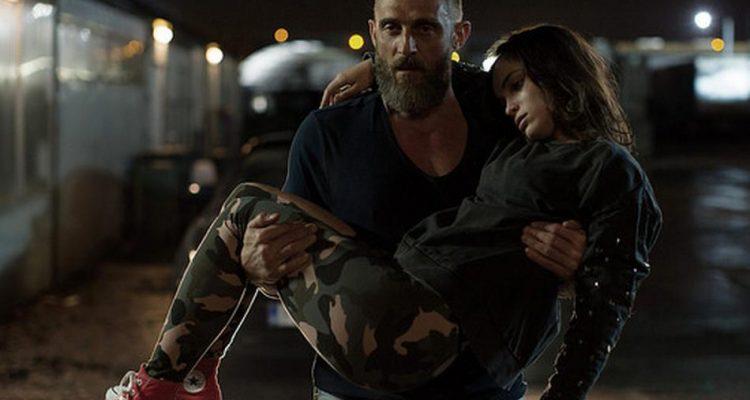“There’s a bluebird in my heart that, wants to get out, but I pour whiskey on him and inhale, cigarette smoke, and the whores and the bartenders, and the grocery clerks, never know that he’s in there,” gritty, downtrodden author Charles Bukowski wrote in the poem, “Bluebird.” While he built a career upon a machismo veneer of womanizing and booze, the tender “Bluebird” spoke to the pain and delicate vulnerabilities inside.
Facades of ruggedness and apathy were a common defense mechanism for Bukowski, who suffered from childhood abuse at the hand of his father. As a result, the poet concocted a larger than life caricature as someone with a rough exterior, devoid of weak or “soft” emotions. This mask is also an anti-hero trope found in cinema. From Ryan Gosling’s “Driver,” to Mel Gibson’s (and Tom Hardy’s) Mad Max, Robert De Niro’s Travis Bickle and now Roland Møller’s Danny, the calloused exterior of broken protagonists continues to prevail as one of the most alluring character molds of any story—literature or film.
Unabashedly paying homage to “Bluebird,” Jérémie Guez’s feature-length directorial debut “A Bluebird In My Heart” translates the poet’s focus on vulnerability as one of the deepest rooted emotions with visual flair despite the film’s commonplace storyline.
A solid, yet run-of-the-mill neo-noir, Euro-crime thriller, Guez’s film follows the mystifying Danny (Møller) a parolee, fresh out of prison, who sets up “home” in a small hotel while an electronic monitor around his ankle acts as a perpetual reminder of the character’s veiled criminal history. In a nice narrative touch, given the anklet already spells it all out, this history remains vague. What Danny went to prison for remains a mystery, the only real mention of his past is when he utters bad boy cliché like, “There’s nothing but trouble for me at home.”
Nevertheless, the hotel’s manager Laurence (Veerle Baetens) unhesitatingly lets Danny stay in return for some home-improvement work around the hotel. Her quick acceptance of Danny is puzzling until it’s made clear she sympathizes with difficult reintegration into everyday life. She’s married to a convicted felon.
In the meantime, Laurence is having a tough time raising her daughter Clara (Lola Le Lann), a disobedient teenager on her own. While Danny is hesitant to reciprocate any affection toward Clara, he realizes that she’s desperately in need of a father figure. As a result, Danny is left conflicted—he wants to console and befriend this girl, but at the same time he is entrapped by a criminal past and his need to reintegrate into society.
Although the struggle to preserve his distant exterior while doing the right thing by essentially adopting the girl as his own is incredibly familiar, Danny’s toil is simultaneously poignant and remarkably admirable as he eventually becomes that father-figure Clara needs.
Unfortunately for the viewer, ‘Bluebird’ quickly devolves into something ordinary and even predictable given the setup of Danny as the fatherly protector. As the ex-convict becomes increasingly complacent in his new lifestyle, smart visual cues suggest trouble has made its way into his comfy confines. Once this impending doom seeps into the emotional linchpin of the film, the relational dynamic between Danny and Clara, “A Bluebird in My Heart” snowballs into sheer revenge, as the ex-convict turns vigilante ala “Taxi Driver” for the remainder of the film.
Even with the rudimentary development of each character, the cast as a whole is stunning. Each actor delivers their lines with depth and conviction, and Møller is especially remarkable as the stoic Danny, whose authentic portrayal of the anti-hero archetype is piercing. Aside from his increasingly admirable actions and budding affinity with Clara, the loyalty in Danny’s eyes accenting his worn facial features accentuate that a “bluebird inside his heart” is agonizingly trying to burst through his chest. Regardless of the ex-con’s poor decisions, his instinctive tendency toward violence and whatever else his past may indicate, viewers soon realize that Danny’s pure-hearted motivations come from a sense of justice and loyalty.
While the acting performances here are a huge selling point, the real highlight of Guez’s debut is visual balladry. Even with the film’s grubby urban setting, cinematographer Dimitri Karakatsanis (“Small Gods”) works his magic and provides the dreary environment a facelift by injecting a drab atmosphere with dreamy shots of early evening and morning lighting.
However, even with high-end performances from both the actors and cinematographer, Guez’s direction struggles to find its voice among films of similar spirit. “A Bluebird In My Heart” is just too safe, reliant on an overwrought plot and atmosphere—it’s dully straightforward and tries to deceive its audience by deploying a stunning visual affair to mask its flaws associated with banality.
Even in its closing moments, ‘Bluebird’ deceives its viewers. Just as the audience is about to give the film some credit for its performances and other worthwhile elements, Guez undermines it, by misguidingly inserting a wholly unnecessary montage of sentimentality that tried to tie together loose ends. Incredibly contrived and adding absolutely nothing to the film, this unfortunate, last-minute conclusion ultimately clouds the story’s most striking message about tough guy pretense that belies a genuinely caring, sensitive heart inside. [C+]
Click here for all our coverage from the 2018 SXSW Film Festival.

